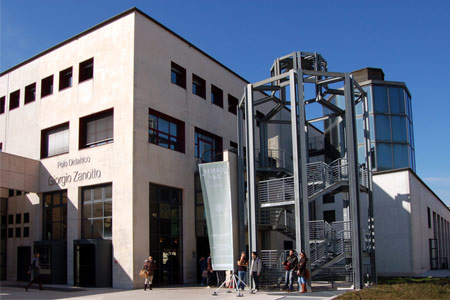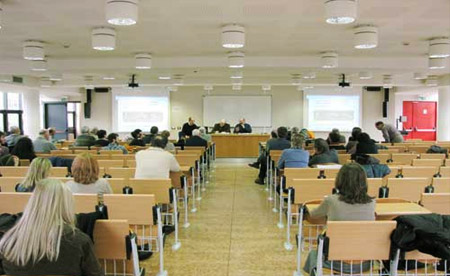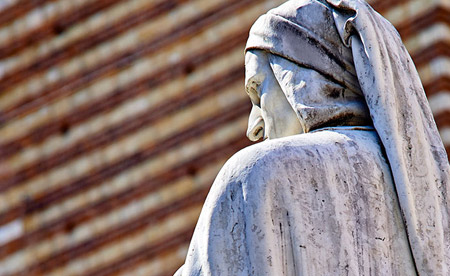The scientific discovery of the environment: the rise of ecology
Introduction
1. Environmental crisis and western thought
2. Man and nature in ancient Greek thought
3. Christian thought and nature
From Renaissance to Enlightenment
4. Bacon and technology: the death of nature?
5. Mines, market an environment
6. Natural theology: Gilbert White of Selborne
7. Linneo (1707-1778): balance and war of nature
The Ninenteenth century: from Romantic nature to Positivism
8. Alexander von Humboldt (1769-1859)
9. Henry D. Thoreau, George B. Emerson, Walt Whitmann
10. Charles Darwin (1809-1882)
Recent developments: the science of ecology between academy and political action
11. Aldo Leopold and the land ethic
12. Ecology as an academic discipline: Elton, Tansley, Lindeman, Odum
13. Rachel Carson (1962); James Lovelock (1979)
14. Jared Diamond: society, environment, responsability
The lecture will consist in two parts. During the first part, the general topic will be introduced by the professor. In second, students will be requested to analyse and debate a series of materials - historical sources and essays - provided in advance in electonic format.
The text strongly suggested for the preparation of the exam is the following: D. Worster, Storia delle idee ecologiche, Bologna, Il Mulino, 1994.
STUDENTS NOT IN CONDITION TO PARTECIPATE TO THE LECTURES ARE REQUESTED TO STUDY, IN ADDITION, J. Diamond, Collasso. Come le società scelgono di morire o vivere, Torino Einaudi, 2005.
A mail contact with the Professor is strongly suggested.
Further bibliographic suggestions:
History of ecology:
D. Worster, The Wealth of Nature, Cambridge, Cambridge University Press, 1991.
P. Acot, Storia dell’ecologia, Roma, Lucarini, 1989. (FIL IV 435)
P. Acot (a cura di), The European Origins of Scientific Ecology, Gordon and Breach, Chateau-Gontier: Imp. de l'independant, 1998.
J.P. Deléage, Storia dell’ecologia, Napoli, CUEN, 1994. (GEO 2180)
W. Leiss, Scienza e dominio. Il dominio della natura: storia di un’ideologia, Milano, Longanesi, 1976. (BF 11 L 136)
J.-M. Drouin, L’écologie et son historie, Paris, Flammarion, 1991.
J. Browne, The Secular Ark, New York, Yale University Press, 1983.
F. Brevini, L’invenzione della natura selvaggia, Torino, Bollati Boringhieri, 2013.
History of environment:
K. Thomas, L’uomo e la natura. Dallo sfruttamento all’estetica dell’ambiente, Torino, Einaudi, 1994.
J. Diamond, Collasso. Come le società scelgono di morire o vivere, Torino Einaudi, 2005
P. Bevilacqua, La Terra è finita. Breve storia dell’ambiente, Roma, Laterza, 2006.
Environmental philosophy:
Evandro Agazzi, La nostra responsabilità per la natura, Piemme, Casale Monferrato, 1995.
Aldo Leopold, Almanacco di un mondo semplice, Como, Red-studio redazionale, 1997
C. Locatelli, Il mondo classico e l’idea di natura vivente, Pisa Edizioni ETS, 1998.
Carolyn Merchant , La morte della natura : le donne, l’ecologia e la rivoluzione scientifica, presentazione di Elisabetta Donini, Milano, Garzanti 1988.
R.F. Nash, The Right of Nature, Madison, The University of Winsconsin Press, 1989.
Piergiacomo Pagano, Filosofia ambientale, Fidenza, Mattioli 1885, 2006.
John Passmore, La nostra responsabilità per la natura, Milano, Feltrinelli 1991.
Sergio Pinna, La protezione dell'ambiente. Il contributo della filosofia, dell'economia e della geografia, Milano, Franco Angeli, 1995.
Nicola Russo, Filosofia ed ecologia. Genealogia della scienza ecologica ed etica della crisi ambientale, Napoli, Guida, 2000.
Mariachiara Tallacchini (a cura di), Etiche della terra : antologia di filosofia dell'ambiente, Milano, Vita e Pensiero, 1998.







